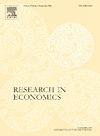Unpacking corruption: The role of economic freedom in developing countries
IF 1.2
Q3 ECONOMICS
引用次数: 0
Abstract
This comprehensive study examines the effects of economic freedom on corruption in a panel of 92 developing countries from 1995 to 2021. The study uses two composite measures of economic freedom: the Fraser Institute and the Heritage Foundation. The study also tests individual subcomponents of each composite economic freedom measure (e.g., regulation and government size). The study finds composite economic freedom measures moderate corruption. The results are robustly tested and consistent across three corruption measures (i.e., ICRG, Transparency International, World Bank), model specifications, and econometric frameworks (e.g., OLS, FE, RE, FGLS, GMM). The study uses the Method of Moment quantile econometric framework to test if there is an uneven effect based on the corruption environment (e.g., low corruption versus high corruption). The study finds economic freedom reduces corruption even in countries with the most rampant corruption, which counters findings from other studies. Economic freedom subcomponent analysis reveals property rights protection and deregulation are particularly effective at reducing corruption. One dimension of economic freedom that can exacerbate corruption is smaller governments, as they may lack the capacity to provide adequate oversight and enforcement of laws and regulations.
揭露腐败:经济自由在发展中国家的作用
这项综合研究考察了1995年至2021年间92个发展中国家的经济自由对腐败的影响。这项研究采用了弗雷泽研究所(Fraser Institute)和美国传统基金会(Heritage Foundation)两种衡量经济自由度的综合指标。该研究还测试了每个综合经济自由指标的个别子成分(例如,监管和政府规模)。研究发现,综合经济自由措施缓和了腐败。结果在三个腐败措施(即ICRG、透明国际、世界银行)、模型规范和计量经济学框架(如OLS、FE、RE、FGLS、GMM)中得到了强有力的测试和一致。本研究使用矩分位数计量经济学框架来检验是否存在基于腐败环境的不均匀效应(例如,低腐败与高腐败)。该研究发现,即使在腐败最猖獗的国家,经济自由也能减少腐败,这与其他研究的结果相反。经济自由子成分分析表明,产权保护和放松管制在减少腐败方面特别有效。经济自由可能加剧腐败的一个方面是政府规模较小,因为它们可能缺乏对法律法规进行充分监督和执行的能力。
本文章由计算机程序翻译,如有差异,请以英文原文为准。
求助全文
约1分钟内获得全文
求助全文
来源期刊

Research in Economics
ECONOMICS-
CiteScore
1.40
自引率
0.00%
发文量
37
审稿时长
89 days
期刊介绍:
Established in 1947, Research in Economics is one of the oldest general-interest economics journals in the world and the main one among those based in Italy. The purpose of the journal is to select original theoretical and empirical articles that will have high impact on the debate in the social sciences; since 1947, it has published important research contributions on a wide range of topics. A summary of our editorial policy is this: the editors make a preliminary assessment of whether the results of a paper, if correct, are worth publishing. If so one of the associate editors reviews the paper: from the reviewer we expect to learn if the paper is understandable and coherent and - within reasonable bounds - the results are correct. We believe that long lags in publication and multiple demands for revision simply slow scientific progress. Our goal is to provide you a definitive answer within one month of submission. We give the editors one week to judge the overall contribution and if acceptable send your paper to an associate editor. We expect the associate editor to provide a more detailed evaluation within three weeks so that the editors can make a final decision before the month expires. In the (rare) case of a revision we allow four months and in the case of conditional acceptance we allow two months to submit the final version. In both cases we expect a cover letter explaining how you met the requirements. For conditional acceptance the editors will verify that the requirements were met. In the case of revision the original associate editor will do so. If the revision cannot be at least conditionally accepted it is rejected: there is no second revision.
 求助内容:
求助内容: 应助结果提醒方式:
应助结果提醒方式:


